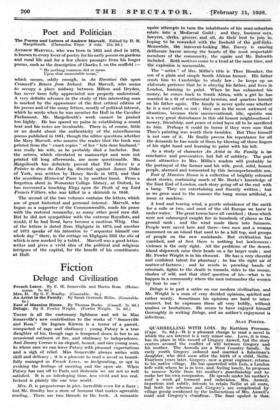Poet and Politician
. . _
The Poems and Letters of Andrew Marvell. -Edited-14 H•:M. Margoliouth. (Clarendon PrVIES. • 2 vols. 316.-6d.) AirnanW MAavEit, -who was bOrn in 1621 and died in 1878, is known to every lover of poetry for his early poems on gardens and rural life and for a few choice passages from, his longer poems, such as the description of Charles I. on- the scaffold
'• • •-• " He nothing common did or mean Upon that memorable scene,"
Which occurs, oddly enough, in An Horatian Ode upon Cromwell's .Return from Ireland. But Marvell, who seems to occupy a Place. Midway. between Milton . and Dryden, has never been fully appreciated nor properly understood. A very definite advance in the study of this interesting man is marked by the appearance of the first critical edition of his poems and of the many letters, mostly of political interest, Which he wrote when he was member. for Hull in the Cavalier Parliament. Mr. Margoliouth's work cannot he praised too, highly. He has spared no pains in establishing a sound text and his notes are invaluable. There is, of course, little or no doubt about the authenticity of the miscellaneous poems published in 1681, though the editor questions whether the Mary Marvell, who assures the reader that the book was printed from the "exact copies" of her "late dear husband," was really his wife, as he probably died a bachelor. But the satires, which circulated in manuscript and were not printed till long afterwards, are more questionable. Mr. Margoliouth has definitely proved that The Advice to a Painter to draw the Duke bY, Henry against James Duke
of York, was written by Henry Savile in 1673, and that the scurrilous Historical Poem is by another hand. From a forgotten sheet in Worcester College library, at Oxford, he has recovered a touching Elegy upon the Death of my Lard Francis Villiers, who was killed in a skirmish in 1648.
The second of the two volumes contains the letters, which are of great historical and personal interest. Marvell, who began as a supporter of the Commonwealth, made his peace with the restored monarchy, as many other good men did. But he 'did not sympathize with the extreme Royalists, and would, if he had lived, have become a cautious Whig. One of the letters is dated from Highgate in 1673, and another of 1675 speaks of his intention to "sequester himself one Whale day" there, in the cottage on Highgate Hill the site of which is now marked by a tablet. Marvell was a good letter. Writer and gives a vivid idea of the political and religious intrigues of the capital, for the benefit of his constituents at Hull.






































 Previous page
Previous page